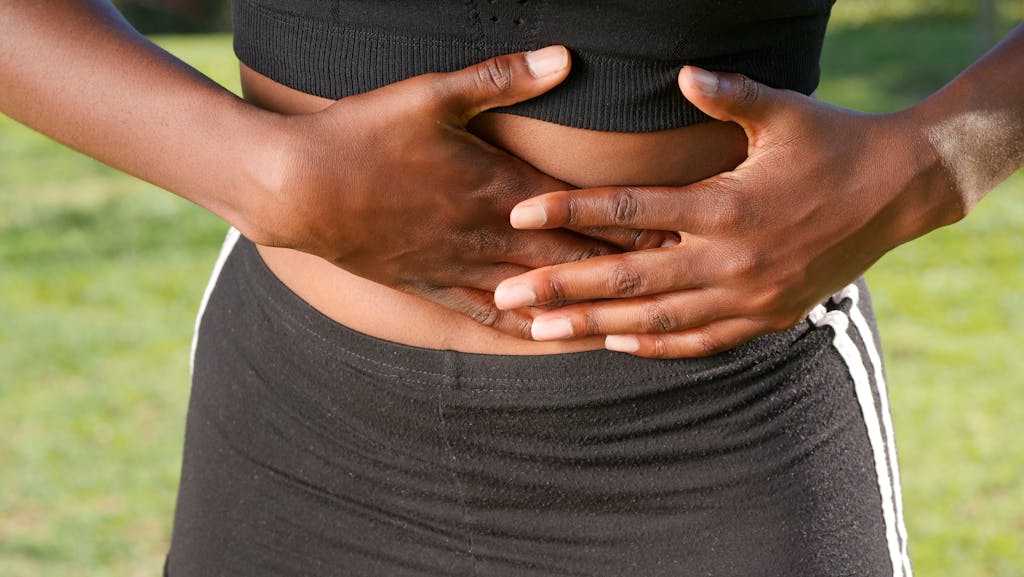As Registered Dietitians, one of the most common complaints we get from current and prospective patients is GI symptoms—bloating, abdominal pain, cramps, nausea, digestive issues. And most of this has to do with our gut health. So to kick off the new year, Culina Health RD Nahyeli Perpina, MS, RDN hosted a webinar breaking down the basics of gut health, as well as diving deeper on what you can do to promote optimal digestion. When we take care of our gut, we can kick some of these unpleasant symptoms to the curb!
You can watch the full webinar recording here, or read on for a recap of what we covered.
A Journey Through the Gut
First, let’s review the journey that food takes, from our plate all the way through our digestive system.
Step 1: Eating & Chewing
Right now, the mouth and esophagus are in play. The action of chewing, plus saliva, plays a critical role in breaking down carbohydrates. In fact, saliva plays an important role in maintaining a balanced oral microbiome through its antimicrobial and nutrient-rich components. It supports the initial breakdown of food and prevents the colonization of harmful bacteria.
If you’ve ever felt like food is stuck in your chest after a rushed meal, that’s likely due to not chewing enough, or eating too quickly. Inadequate chewing increases the size of food particles, making swallowing harder and potentially leading to the uncomfortable sensation of your food being stuck. Eating too fast also bypasses the initial breakdown of carbohydrates by salivary amylase. Thorough chewing supports digestive enzyme activity by increasing the surface area for enzymatic action improving carbohydrate breakdown, and minimizes esophageal discomfort.
Step 2: Digestion
Next, food has moved into the stomach, where stomach acid and enzymes break food down into smaller particles and proteins begin to digest. A healthy stomach lining will protect you against any harmful bacteria you may have ingested, while low stomach acid can cause bacterial overgrowth, lead to bloating or indigestion.
If you’ve ever felt bloated or burped a lot after eating, it could be your stomach struggling to break down food, especially heavy meals and spicy foods. This is because overeating and certain foods (spicy, high-fat) can delay gastric emptying and increase gas production or acid reflux, which causes bloating or burping. Eating smaller portions can improve stomach motility, and remaining upright after eating prevents acid reflux by reducing stomach pressure.

Step 3: Absorption
At this stage, food moves into the small intestine, where nutrients are absorbed into the bloodstream. The pancreas and liver help with digestion, while beneficial bacteria help break down nutrients, especially fiber and complex carbs, for your body to use. An imbalance of good vs. bad bacteria can lead to bloating and diarrhea and negatively affect your digestive health.
Here is where fiber plays a major role—how much fiber you consume directly influences microbial fermentation and gut motility, promoting regular digestion. If you feel fatigued after eating, it might be due to poor absorption in your small intestine—especially if you skip veggies or eat a lot of processed foods.
Step 4: Fermentation
Now, food enters the large intestine, or colon, where the gut microbiome ferments undigested fiber, producing short-chain fatty acids that support the gut lining and promote immune health. Water is reabsorbed here, too—promoting hydration. Diversity in gut bacteria is key at this stage—as imbalances may result in constipation, gas, or inflammation.
Do you notice more gas or bloating after eating beans or cruciferous veggies? That’s your microbiome hard at work fermenting fiber! Foods like beans and cruciferous vegetables are high in fermentable fibers, which beneficial gut bacteria metabolize into gases and short-chain fatty acids. While this process can cause temporary bloating, it is beneficial for gut health and overall digestive health.
Step 5: Waste
Finally, food moves into the rectum and anus to be excreted as waste products. Regularity, aka how often this happens, depends on hydration, fiber intake, and microbiome health. Healthy gut bacteria promote timely elimination, while imbalances in gut bacteria may cause constipation and diarrhea.
Have you noticed changes in your bowel habits while traveling or during extra-busy times? Travel, stress and dietary changes can all disrupt microbial balance and dehydration affects stool consistency, leading to constipation.

Simple Habits to Promote a Healthier Gut
- When eating, slow down and savor! Take time to eat slowly and without distractions, and chew your food thoroughly until it is around the consistency of applesauce. Mindful eating strategies like this can reduce bloating, support digestion, and help you feel full faster.
- Eat fermented foods. Fermented foods enhance gastric microbial diversity and digestive health, while bitters stimulate digestive enzyme and acid production.
- Get moving to…get moving. Incorporating daily physical activity like walking, yoga, or light stretching stimulates digestion, reduces stress, and promotes healthy bowel function.
- De-stress. Stress can impede digestion and upset the balance of bacteria in your gut. Try deep breathing techniques, a short yoga or meditation session, or other stress-regulating strategies to relieve GI symptoms or constipation.
- Sleep tight. Sleep supports the gut-brain connection and helps regulate digestive processes! Aim for 7-9 hours of good sleep each night to promote a healthy gut.
- Check in, record, and reflect. Keep a journal to record how your body feels after eating and identify any triggers for GI symptoms. You can also use this to assess which gut-health habits are moving the needle for you, so you know which to prioritize!
How a Registered Dietitian Can Help
While these science-backed strategies have been proven to impact gut health, every person, and every body is different, and implementing these dietary and lifestyle changes can be challenging. That’s where a Registered Dietitian can help! Through personalized nutrition therapy, an RD can work directly with you on strategies on everything from hydration and eating patterns, to education, stress management, mindful eating, and even sleep habits. An RD can also work with you on keeping and analyzing a food journal, guide and support you through an elimination diet to identify your food triggers, then coach you through the process of eliminating trigger foods from your diet while filling in any nutritional gaps—from providing meal plans that account for your food preferences to grocery lists that fit into your budget, and more. A dietitian can also provide recommendations on probiotics or a probiotic supplement, a digestive supplement, and other additions to your diet that promote a healthy microbiome.
The RDs at Culina Health are here for you, and we are in network with most major insurance plans! You can match with a Registered Dietitian today to get started on your health goals.





